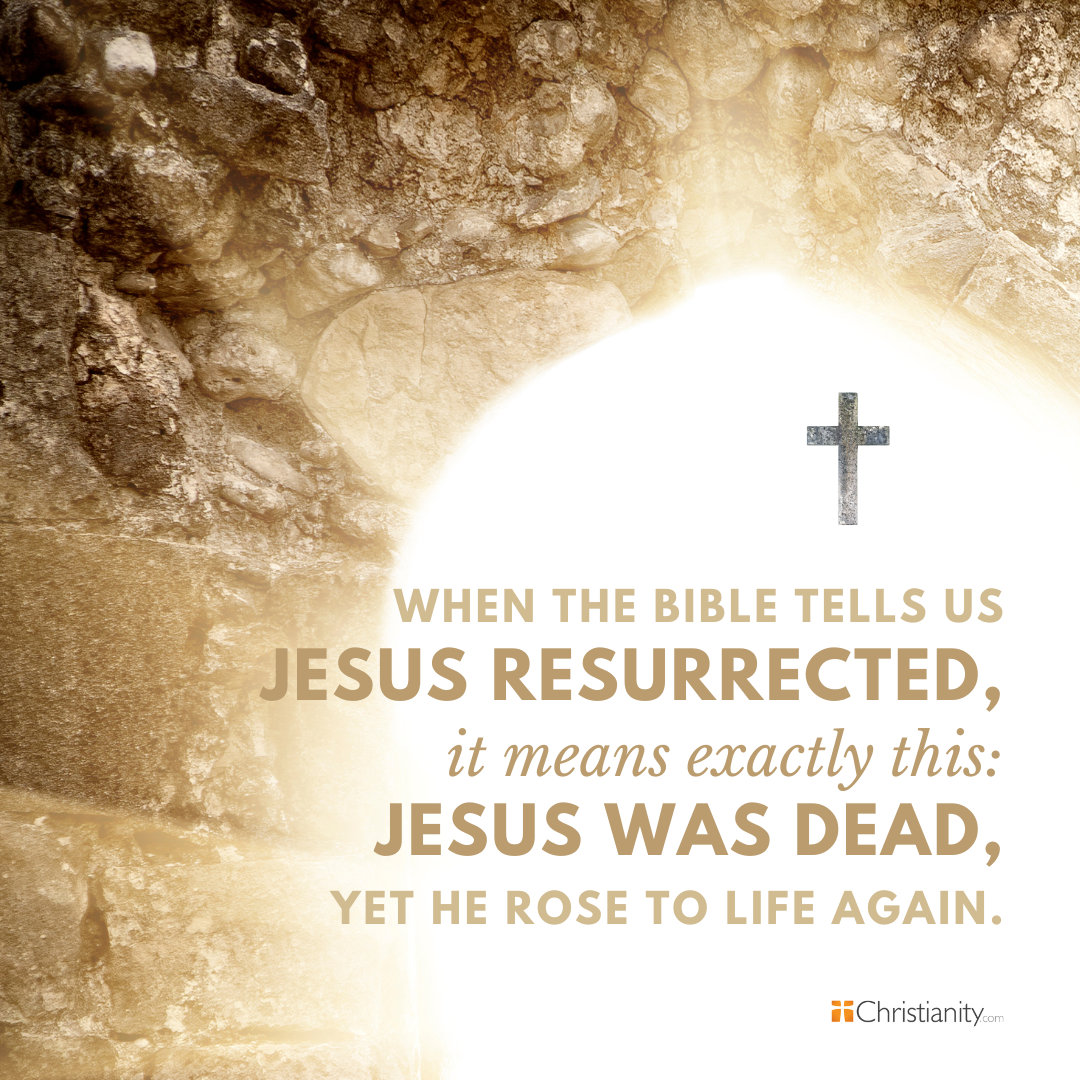Every Easter, we gather at church and hear the familiar story: How, three days after Jesus was crucified and laid to rest in a tomb, women went to anoint his body and found the tomb empty and the heavy stone guarding the entrance rolled away.
“He is not here; he has risen, just as he said,” an angel informed them. “Come and see the place where he lay.” - Matthew 28:6 NIV
Indeed, soon they and the other disciples soon became privy to the merciful and astonishing gift God had planned for his people, that he would send his one and only Son to die on the cross for our sins, paying our sin debt and paving the way for our eternal souls. As Jesus himself proclaimed in John 3:16,
“For God so loved the world that he gave his one and only Son, that whoever believes in him shall not perish but have eternal life.”
But it’s one thing to read those words or hear that teaching in church and know this happened 2,000 years ago to a group of Jesus’s followers, and another thing entirely to understand what that means for us today. After all, we’re not Jews living under Roman occupation, and most of us today aren’t persecuted for our religious beliefs. This begs the question: What does Jesus’s resurrection mean for us today?
The answer is a source of deep comfort, one that transcends any possible concerns on this earth or in this lifetime. Jesus’s resurrection then, even 2,000 years ago, means that all of us who believe today, and even years into the future, can have the assurance that even though our physical bodies die, our souls will live forever in God’s kingdom. This is what Jesus called the “good news,” and it is something every human being has access to if they so desire.
What Is the Resurrection?
The word “resurrection” means to come to life, typically after death. In John 11, after the death of his friend Lazarus, Jesus told Martha and Mary,
“I am the resurrection and the life. The one who believes in me will live, even though they die; and whoever lives by believing in me will never die.” John 11:25-26
The original Greek used here is anastasis, which means resurrecting, or rising to life—the act of going from sitting or lying down to standing. It’s the same word used in Acts 1:22, when they spoke about needing to replace Judas Iscariot with an apostle who had been a witness to the resurrection of Jesus. Plainly, the word resurrection isn’t a metaphor but a literal term. When the Bible tells us Jesus resurrected, it means exactly this: Jesus was dead, yet he rose to life again.

Indeed, when he appeared to the apostles after his resurrection, he asked them to touch him as proof (Luke 24:39) and even ate some broiled fish (v. 43). He showed them the wounds in his hands and feet from his crucifixion and invited them to place their hands into him and so believe (John 20:19-29).
Why Did Jesus Die and Resurrect?
Jesus repeatedly told his followers that he would be rejected and killed, then raised to life on the third day. As he told his disciples in Mark 9:31,
“The Son of Man is going to be delivered into the hands of men. They will kill him, and after three days he will rise.”
Indeed, this happened exactly as he said it would. He also told the Pharisees and Sadducees that they were wicked in seeking a sign from heaven, noting no sign would be given to them “except the sign of Jonah” (Matthew 16:4). This, too, alluded to his death and resurrection, for the prophet Jonah was swallowed by a fish and spent three days in darkness before his resurrection.
Scripture tells us that at the time of his death, the curtain of the temple was torn in two from top to bottom, symbolizing that his sacrifice on the cross atoned for our sins. Now, the Holy of Holies was open for all people, not only Jews, to approach God and have a relationship with him. The apostle Paul further explained that Jesus was the perfect sacrifice, the flawless lamb. As he stated in Romans 3:25-26,
“God presented Christ as a sacrifice of atonement, through the shedding of his blood—to be received by faith. He did this to demonstrate his righteousness, because in his forbearance he had left the sins committed beforehand unpunished—he did it to demonstrate his righteousness at the present time, so as to be just and the one who justifies those who have faith in Jesus.”
Jesus’s sacrifice was necessary, and it means all who choose to believe and follow him can enjoy the gift of forgiveness and eternal life.
What Does the Resurrection Mean for Us When We Die?
Essentially, Jesus’s resurrection paves the way for our own resurrection. Because we know Jesus Christ lives, we who believe in him know we also can live. When Jesus told Lazarus’s sister Martha that “whoever lives by believing in me will never die” (John 11:26), he spelled out exactly what is in store for us who believe. Our bodies will die, but our souls will never die. As the apostle Paul writes in Romans 8:10,
“But if Christ is in you, then even though your body is subject to death because of sin, the Spirit gives life because of righteousness.”
The apostle John writes in 1 John 5:12,
“Whoever has the Son has life; whoever does not have the Son of God does not have life.“
Because of Jesus, we have life forever. As Jesus promised in John 14:2-3,
“My Father’s house has many rooms; if that were not so, would I have told you that I am going there to prepare a place for you? And if I go and prepare a place for you, I will come back and take you to be with me that you also may be where I am.”
You know the way, he told his followers—“I am the way and the truth and the life. No one comes to the Father except through me” (v. 6).
What Does Jesus' Resurrection Mean for Us Today?
This means we don’t need to fear the suffering and difficulty we experience. Instead, we are to follow Jesus' example and the commandments he passed on. We are to believe in him completely and repent of our sins. If we belong to him, we can be assured that we will join him in heaven. We have victory over death. This means we can walk in hope, trusting that the future is bright. We can live completely for God, knowing that our place is secure. And we must share this good news with other people so they, too, can know the truth that sets them free. Before his ascension to heaven after the resurrection, Jesus gave his followers what is called the Great Commission, commanding them,
“Therefore go and make disciples of all nations, baptizing them in the name of the Father and of the Son and of the Holy Spirit, and teaching them to obey everything I have commanded you. And surely I am with you always, to the very end of the age.” - Matthew 28:19-20
They weren’t supposed to selfishly hoard the promises, truth, and hope of Jesus Christ to themselves. No, they were to share it with all nations and all peoples so that all may know the good news. Today, we can live fully with perfect peace, hope, and joy knowing that our future belongs to the Lord, and our place in his heavenly home is secure when we pledge our lives and our hearts to him. So rejoice, my friends, and share this truth with others. For this is indeed good news. Amen, and thanks be to God.
Photo Credit: ©GettyImages/KatarzynaBialasiewicz




